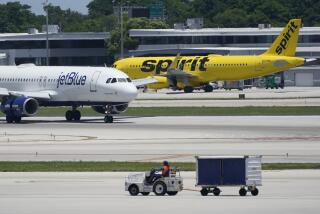Texaco Turns Down Chevron Merger as ‘Unacceptable’
- Share via
Texaco Inc. rejected an “unacceptable” merger offer Wednesday from Chevron Corp. and terminated negotiations, the two companies announced separately, with each energy giant vowing to proceed as an independent company.
But in the midst of the most profound energy industry consolidation in 30 years, both Chevron of San Francisco and Texaco of White Plains, N.Y., remain on the block, analysts said.
“Everyone has been talking to everyone,” said Kate Warne, energy analyst with the investment firm Edward Jones in St. Louis. “The fact that this one became public was a little embarrassing because it was clearly too early.”
Neither Texaco nor Chevron, ranked third and fourth among U.S. oil companies by revenue, had previously acknowledged it was conducting the discussions that the companies now say they are no longer conducting. The proposed deal, which would have involved exchanging Texaco stock for Chevron stock, is believed to have been worth about $42 billion.
Texaco said in a statement Wednesday that the proposal from Chevron was “unacceptable in all respects . . . for reasons including complexity, feasibility, risk and price.” Texaco’s board of directors “found no compelling basis for discussions to continue.”
Chevron replied with its own statement confirming that Texaco had spurned its proposal.
“I’m surprised that the Texaco board turned down a very competitive offer that included a significant price premium to Texaco shareholders and an opportunity to receive Chevron stock, with its acknowledged strong growth prospects,” said Kenneth T. Derr, Chevron chairman and chief executive.
Industry analysts said Chevron and Texaco would have fit together nicely and strengthened long-established ties. The companies are joint owners of Caltex, a 63-year-old refining and marketing venture that operates in Asia, Africa and the Middle East.
The companies were lured to combine for the cost savings that would have resulted as well as the bigger financial muscle to compete with foreign governments and the new trio of “supermajors”: Exxon and Mobil, whose merger is still pending, BP Amoco and Royal Dutch/Shell.
But the deal would have faced significant antitrust hurdles in the refining and retailing of gasoline and other petroleum products. Texaco also would have faced the complexity and expense of unraveling its year-old U.S. refining and marketing ventures: Equilon, a joint venture with Shell that operates in the Western U.S., and Motiva, a joint venture with Shell and Saudi Aramco that operates in the East.
Leadership issues also reportedly clouded the negotiations. Derr, 62, who underwent prostate cancer surgery a year ago, already has an heir apparent in Chevron Vice Chairman David O’Reilly, 51. But Texaco Chairman and Chief Executive Peter I. Bijur, 57, was said to have been unwilling to cede power.
The merger frenzy began last summer in the heat of plunging oil prices when British Petroleum unveiled its $48-billion acquisition of Amoco Corp.
The announcement came after the close of trading. Chevron shares gained $1.56 to close at $92 on the New York Stock Exchange. Texaco shares rose 31 cents to $64.50, also on the NYSE.
More to Read
Inside the business of entertainment
The Wide Shot brings you news, analysis and insights on everything from streaming wars to production — and what it all means for the future.
You may occasionally receive promotional content from the Los Angeles Times.










